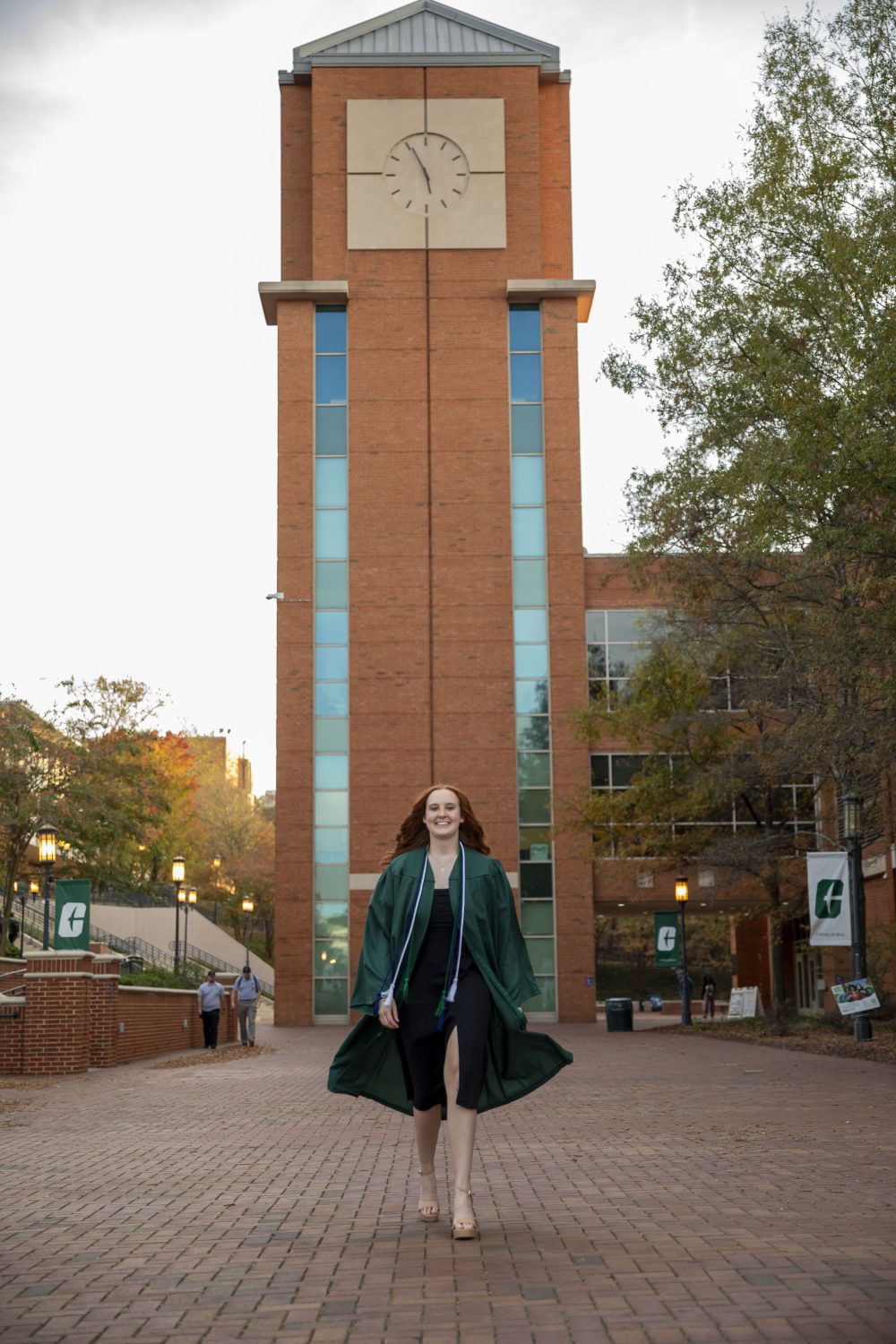Five KCOS faculty named Senior Members of National Academy of Inventors
The National Academy of Inventors (NAI) has announced the 2025 class of Senior Members, with seven of the newly named members from UNC Charlotte. Senior Members were selected from NAI’s member institutions for exemplifying the spirit of creativity and discovery that drives the global inventor community.
Five faculty from the Klein College of Science were named as Senior Members:
- Kirill Afonin, Ph.D., professor of chemistry
- Glenn Boreman, Ph.D., professor and department chair of physics and optical science
- Jordan C. Poler, Ph.D., professor of chemistry
- Susan R. Trammell, Ph.D., professor of physics and optical science
- Michael G. Walter, Ph.D., professor of chemistry and director of nanoscale science Ph.D. program
“This year’s class comes from a multitude of impressive fields and research backgrounds from across the world. We applaud their pursuit of commercialization to ensure their groundbreaking technologies can make a difference by tackling the world’s most pressing issues, improving quality of life across society, and advancing the economy,” said Paul R. Sanberg, president of NAI.
The Klein College faculty are also joined by two faculty members from the William States Lee College of Engineering. All seven Senior Members from Charlotte will be inducted at the NAI annual meeting in June, accompanied by Ishwar D. Aggarwal, Ph.D., who was recently named a 2024 Fellow from NAI.
The conference presents the opportunity for visionaries and innovators to converge to share ideas, foster collaborations, and celebrate advancements in invention.
Mathematics Graduate Student Association Hosts Inaugural Symposium
The Mathematics Graduate Student Association (MGSA) hosted the inaugural Graduate Research in Math (GRiM) symposium at UNC Charlotte on Feb. 8, fully planned and executed by and for graduate students.
The Klein College of Science graduate students presented on a variety of mathematical fields, ranging from pure to applied mathematics, and covering topics including graph theory, Ergodic theory, and statistics. Attendees included graduate and undergraduate students and faculty from UNC Charlotte, the University of South Carolina, and Clemson University.
The symposium’s plenary lecture, “On Turing’s formula and the estimation of the missing mass,” was presented by Michael Grabchak, Ph.D., professor of statistics. Grabchak explored how Turing’s formula can give rise to methods for detecting whether two works were written by the same author. Results from this method were shown through examples ranging from Shakespeare to celebrity social media posts.
Sarah Helfert Murphy, graduate assistant in the Department of Mathematics and Statistics, helped to reinstate MGSA as an active campus organization in 2021. “There is no one-size-fits-all formula for getting a Ph.D. in mathematics, so we thought this event would be a nice way to showcase the different forms getting a degree in this field can take,” Murphy said. “I consider it a great success, and we hope to offer this event again next year, and to expand our horizons to invite participants from even more universities.”
Since reactivating MGSA, the organization has offered more events each year for graduate students interested in math. MGSA’s current goal is to offer events that both cultivate a sense of community among graduate students and provide opportunities to grow academically.
“In graduate school, it can be very easy to isolate yourself due to the demanding workload. We seek to mitigate this by encouraging students to talk about math and bond over our shared experience,” Murphy explained. “Our organization also serves to advocate for graduate student interests in the mathematics department.”
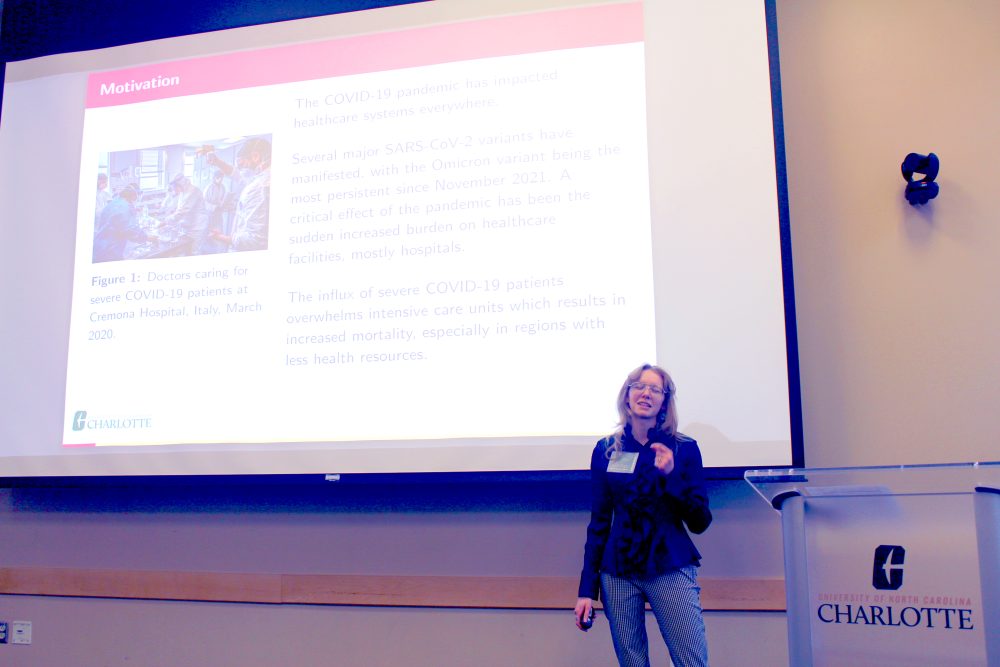
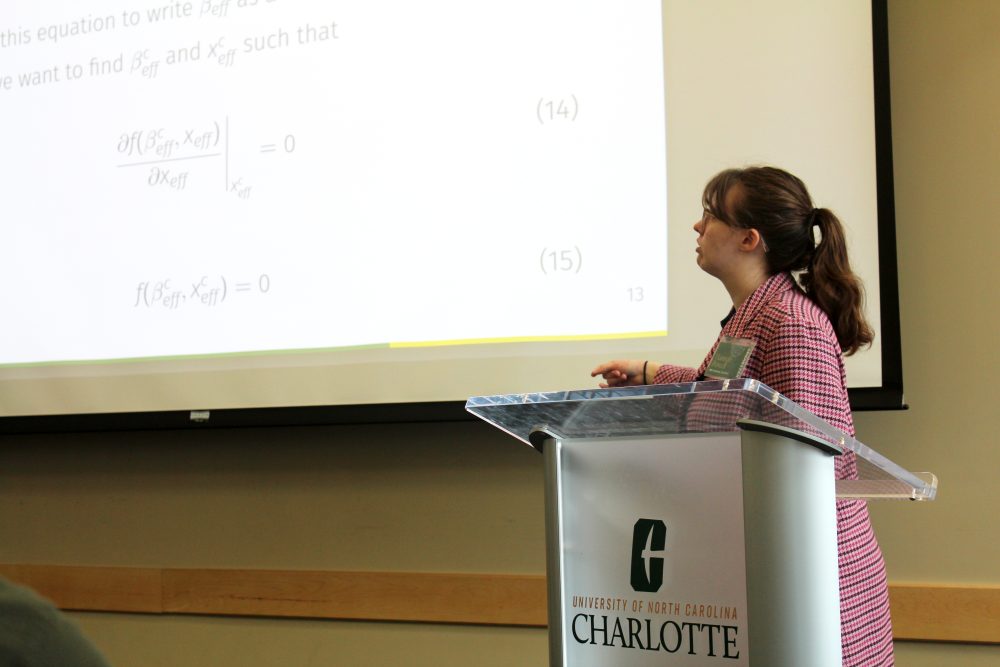
Susan R. Trammell wins International Patent Award
Susan R. Trammell, Ph.D., professor of physics and optical science, has earned a Prince Mohammad Bin Fahd University (PMU)-National Academy of Inventors (NAI) International Patent Award.
The PMU-NAI International Patent Award recognizes international inventors who create plausibly positive societal impact with an innovation that has received a patent from the United States Patent and Trademark Office within the past 5 years.
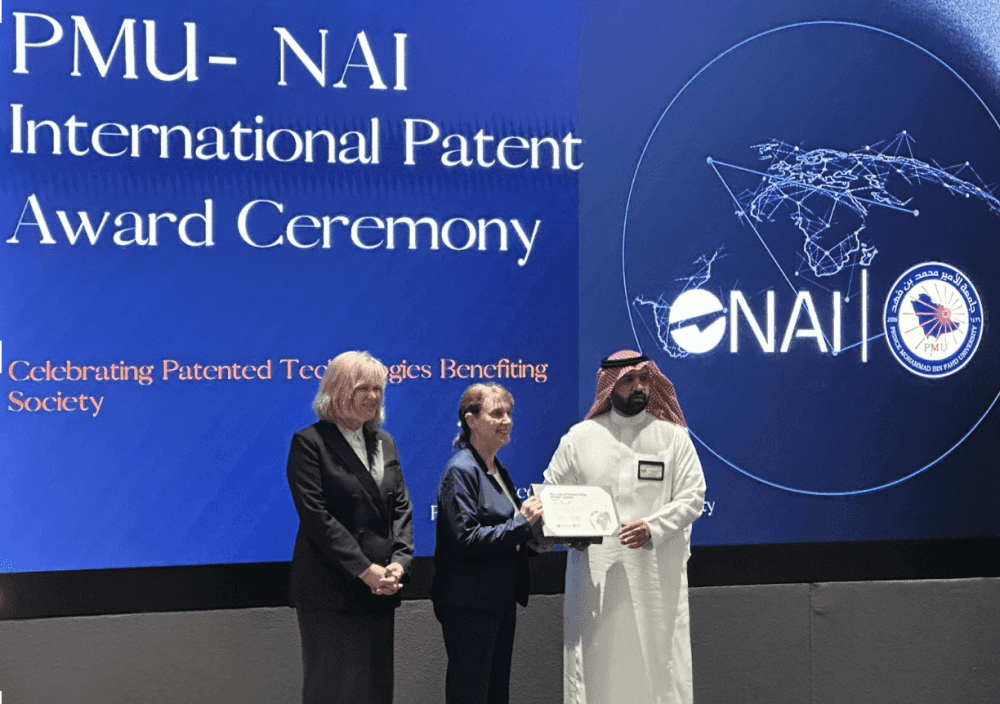
Trammell accepted the award in December 2024 during a ceremony on PMU’s campus in Saudi Arabia. Her third place win included a $10,000 prize to assist in the commercialization of the patent to help bring the technology to market.
Trammell’s research in optics in the Klein College of Science has developed innovations in the fields of biomedical imaging, mid-IR/thermal imaging in medicine, surgical navigation and image-guided surgical interventions.
In 2023, Trammell was recognized as co-author with the Biopreservation and Biobanking Best Paper award from ISBER, the International Society for Biological and Environmental Repositories, for the best paper.
Read more about Trammell’s award from the UNC Charlotte Division of Research.
TAIMING AI and CITRANS leading the way with Charlotte AI Institute
UNC Charlotte announced the formation of the Charlotte AI Institute with the Center for TAIMing AI and the Center for Innovation, Translational Research and Applications of Nanostructured Systems, CITRANS, leading the way.
These two Centers are leveraging the quickly developing field of artificial intelligence to create cutting-edge discovery, interdisciplinary collaboration and workforce development. The Centers are driving innovation along with advanced research from the Klein College of Science in biological sciences, physics and optics, chemistry, and mathematics and statistics.
Faculty in Klein College also make important research contributions to CIPHER, the Center for Computational Intelligence to Predict Health & Environmental Risks.
Read more about the Charlotte AI Institute.
Klein College of Science Centers leveraging AI
KCOS researchers Afonin and Johnson in Newswise: Reimagining Personalized Medicine with AI-Cell
Kirill Afonin, Ph.D., professor of chemistry, and M. Brittany Johnson, Ph.D., assistant professor of biology, were featured in Newswise for their research on nucleic acid nanoparticles (NANPs), which are highly effective in drug or vaccine delivery.
The Klein College of Science researchers, along with Drs. Dobrovolskaia’s (NCI) and Zakharov’s (NCATS) teams, have developed new applications for Artificial Intelligence Cells. AI-Cell uses artificial intelligence to quickly select the appropriately shaped nanoparticles that can deliver targeted treatments personalized to an individual’s DNA.
“If designed correctly, your body will recognize these artificially made NANPs as its own components, which can initiate and guide various biochemical processes and help fix the problem from within,” Afonin said. “The big idea is to develop a biomolecular language to explain to our bodies and immune system how to reveal and deal with certain diseases – and make this technology user-friendly, widely available, personalized, and affordable.”
The NANPs can fold in specific, predictable ways, and quickly selecting the correct shape to generate the intended immune response helps target the therapy to the precise location.
“The immune system is a very complex process,” Johnson said. “A lot of times we think the immune response is always productive. In reality, it’s a little bit more like a see-saw and you want things to be in balance.”
“You need peaks at certain times… and you want that immune response to have certain qualities. And then you want that to resolve so that you can go through a healing process,” Johnson said. “You have to be cautious because you could stimulate an unwanted immune response.”
Jordan Poler featured on WBTV for PFAS Filter Innovations
Jordan C. Poler, Ph.D., professor of chemistry, was featured as the cover story on WBTV’s “On Your Side Tonight” to discuss his innovations on filtering forever chemicals from water supplies with a purification method he designed.
Poler spoke with reporter Natisha Lance to explain how his innovation, funded last year as one of eight grants statewide from NCInnovation, uses sustainable and low-cost materials to remove contaminants and chemicals such as per- and polyfluoroalkyl substances, PFAS, from water.
The filters can be regenerated nearly indefinitely, which allows for the chemicals to be removed without concentrating them elsewhere by disposing of the filter.

“What you’ve done is you’ve concentrated all the impurities onto that filter and then you put it into the landfill and all those impurities leach back out,” Poler said. Poler’s innovation allows the filter contents to be regenerated and used again. “We can keep on going for hundreds of cycles without any loss in performance so it’s a sustainable solution to a really difficult environmental problem.”
Poler has engaged in this research for eight years and is hoping to be able to bring the sustainable water filter to the market within a year.
“We don’t have to create an environmental problem while we’re trying to solve an environmental problem,” said Poler. “It’s really rewarding working on something that could have a direct impact on people.”
Elizabeth Skelly secures prestigious GSK internship
Elizabeth Skelly, a Ph.D. student in the Chemistry and Nanoscale Science program, has received a 5-month internship at GSK through the prestigious GSK Early Career Program. Skelly will start her position on January 13 and will be assisting in drug target discovery and candidate evaluation using cutting-edge CRISPR Cas 9 genome editing techniques.
Skelly is also the recipient of the Leadership Development Award from the American Chemical Society Younger Chemists Committee. The award covers the registration fee, transportation, lodging, and meals associated with attending the 2025 ACS Leadership Development Institute in Houston. Skelly will interact with National ACS representatives and with ACS Local Section leaders from across the country while attending leadership development workshops.
Jordan Poler’s research on water filtration and removing PFAS highlighted
Jordan C. Poler, Ph.D., professor of chemistry, discussed his innovations to remove harmful and forever chemicals from drinking water with the Costal Review. Poler’s research is funded in part by a grant from NC Innovation.
The purification system developed by the Poler Research Group cleans per- and polyfluoroalkyl substances, or PFAS, and other toxins such as pesticides, heavy metals and pharmaceuticals from drinking water at the point of use, such as the refrigerator filter for tap water or in well water systems. The filtration utilizes ion exchange with sustainable, regenerable materials, which can remove chemicals even at very low concentrations.
“It’s very hard to remove things at extremely low concentrations,” Poler said. “That’s why PFAS is such a challenge because it bioaccumulates. You can be drinking this water for years and then these problems creep in. So, ion exchange is, I think, the way to go,” Poler said.
Read the full article at the Coastal Review.
The article was also republished in NC Health News.
Ishwar D. Aggarwal elected as National Academy of Inventors Fellow
Ishwar D. Aggarwal, Ph.D., research professor in the Klein College of Science, was elected to the National Academy of Inventors (NAI) 2024 Class of Fellows. He will be inducted during the 14th annual NAI meeting in June 2025 among an elite group of researchers across a variety of government and non-profit research institutions.
Aggarwal has been issued 104 U.S. patents with more applications in process. He previously lead the Optical Materials and Devices branch at the Naval Research Laboratory (NRL), where he pioneered the development, applications and commercialization of infrared transmitting optical materials, chem-bio sensors and high strength transparent materials, and moved patents from emerging technologies to the industrial sector in medical, defense, and aerospace applications.
Aggarwal joined UNC Charlotte in 2011 and his research lab in the Department of Physics and Optical Science works in fiber optics, optical wave guides, fiber devices, and transparent and laser gain ceramics.
His contributions to the optical sciences field have been recognized by many awards and distinctions, including a fellow of The Optical Society of America (OSA), now known as Optica, the Navy’s Alan Berman Publication Award, the Thomas A. Edison Patent Award, and the Optical Society of America’s David Richardson Medal. He was recently inducted into UNC Charlotte’s inaugural Million Dollar Research Circle for his significant research funding achievements.
The NAI Fellowship is the highest professional distinction awarded solely to inventors, and Aggarwal is the first UNC Charlotte professor to receive this esteemed recognition. He joins NAI fellow Robert Keynton, Ph.D., dean of the William States Lee College of Engineering, who was elected in 2017, prior to his time at UNC Charlotte.
Read more about Aggarwal’s fellowship from the UNC Charlotte Division of Research.
Jaden Ramsey Made the Most of Every Moment at Charlotte
Jaden Ramsey’s time at UNC Charlotte has been so enjoyable, that even though she is graduating on December 13, she doesn’t really want to leave.
“I love being part of a community and you’re a part of something bigger than yourself when you’re at school,” said Ramsey, who is earning a bachelor’s of science degree in mathematics with a concentration in actuarial science, from the Klein College of Science.
When Ramsey graduated from high school she wasn’t completely certain what she was interested in pursuing, so she took classes online at Western Piedmont Community College at the start of the COVID-19 pandemic. “It was definitely hard because I love being around people,” said Ramsey. “I took a walking class so I got to go to school once a week and I could be outside and walk around school.”
In her sophomore year Ramsey was able to attend more classes in person. Enjoying fitness, she took several more gym classes and she found her academic passion in mathematics. “I fell in love. I love math, I just love calculus,” said Ramsey.
Choosing Charlotte
Ramsey applied to several North Carolina schools as a transfer student but wanted to find the right place to spend the next two years, where she could maximize her experience.
“My mom went to Charlotte, and she loved it, but I was unsure because it was a big decision. I applied to three schools and prayed a lot about it and felt like this was where God was leading me. I’m really happy I chose Charlotte,” said Ramsey. “My first semester I knew no one and it was really hard, but I got involved and now I don’t want to leave.”
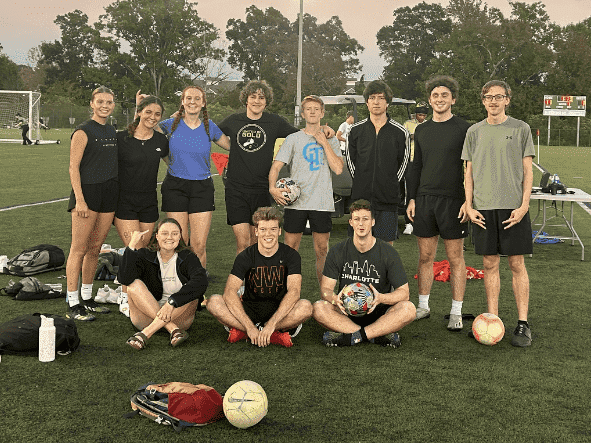
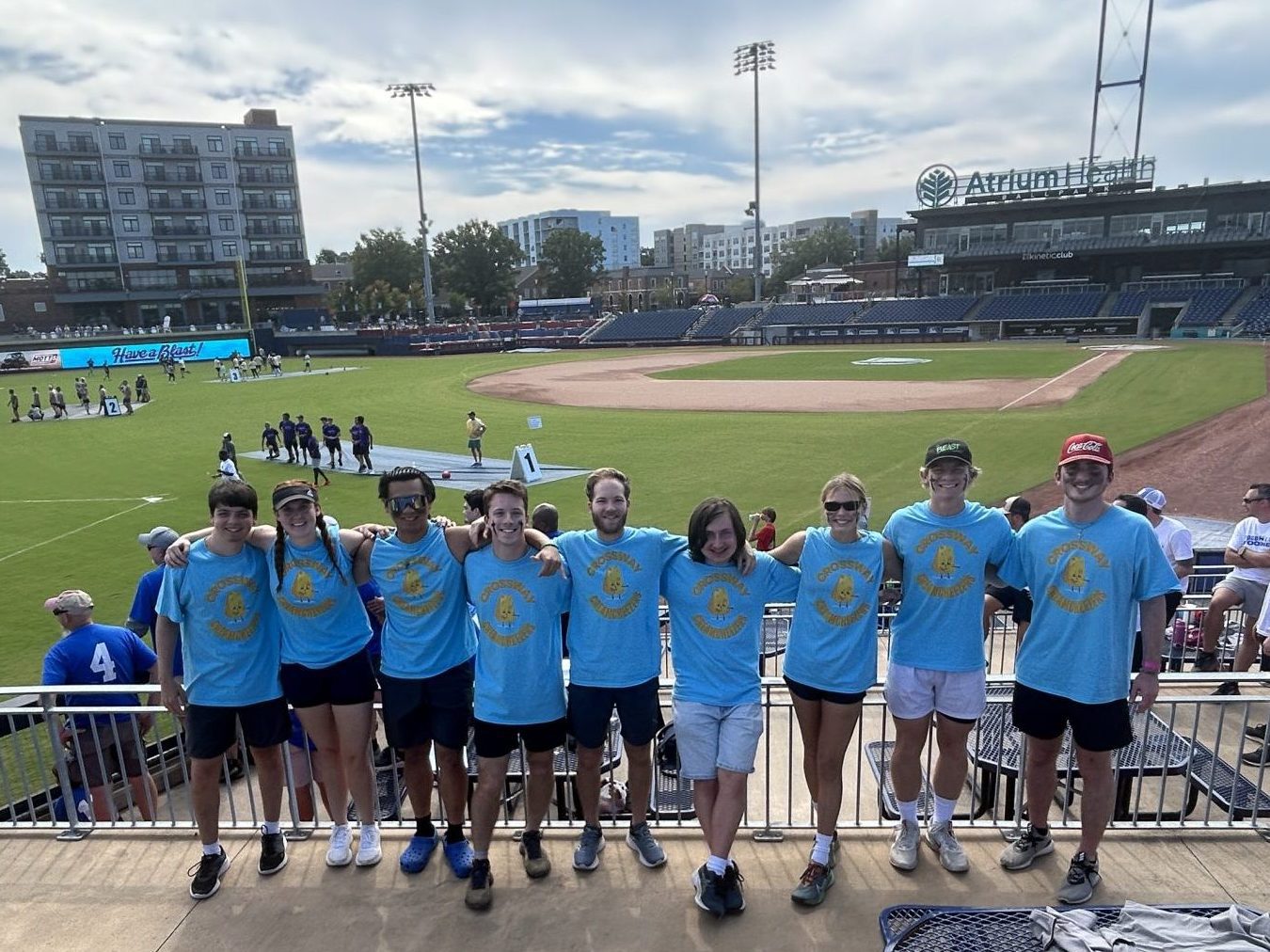
Getting Involved
Ramsey lived on campus, played intramural sports and became a member of two different Christian ministry groups. She joined clubs and found community everywhere she could, making great friends and having experiences she will never forget. Ramsey served as secretary, treasurer, and then president of Campus Bible Fellowship, making a connection that led to her first international travel experience with a mission trip to Italy this past summer. She was also a member of student ministry group M28 for two years.
She took classes at UREC and played several intramural sports including flag football, soccer and volleyball. Ramsey was the captain of her 6 v. 6, co-ed, intramural fall 2024 soccer team called “The Jesus Jocks,” and really enjoyed playing with her “awesome team” as they advanced into the semi-finals in league play.
A Leadership Lesson in Actuarial Science
Relating to her degree, Ramsey was a member of the Actuarial Science club for one and a half years, and was elected in May to serve as president through the end of her last semester and graduation.
This September, the club helped plan Actuarial Science Day, hosting employers, alumni, and high schoolers and their families. The event turned into a leadership lesson when Hurricane Helene caused localized flooding and damage on the day of their largest annual event, which changed campus conditions and moved classes online. Ramsey swung into action when the large catering order meant it wasn’t as simple as rescheduling the event.
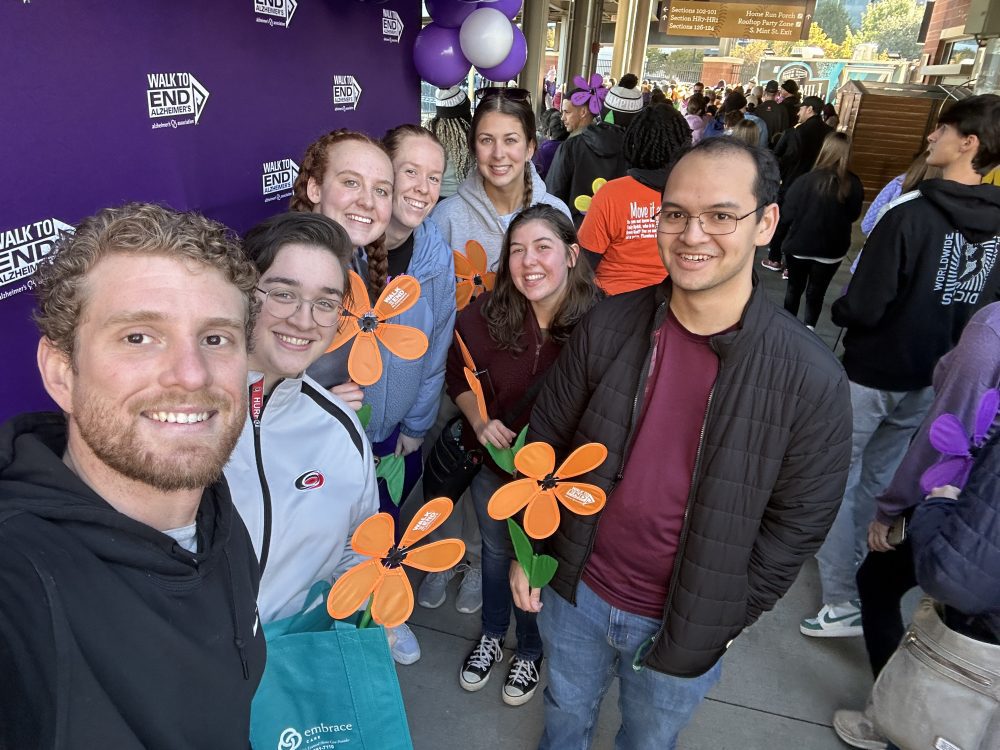
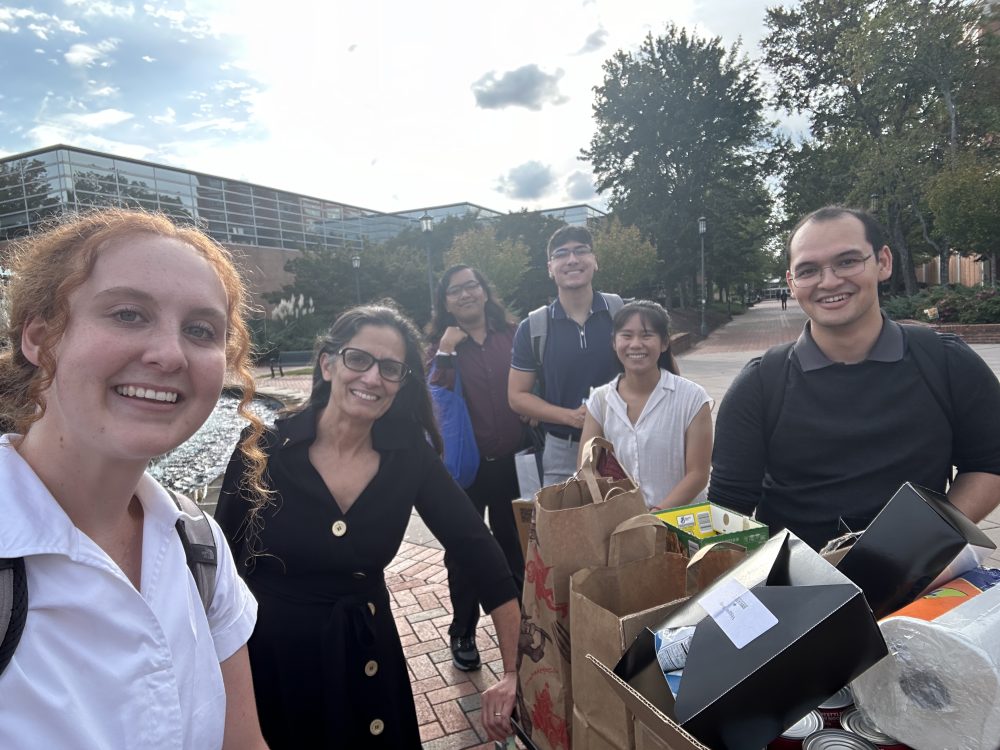
“That day I was in contact with the faculty and the business services coordinator, trying to figure everything out. They make the food a day ahead of time, and I didn’t want a hundred boxed meals to go to waste, so I paid the fine, which thankfully I was reimbursed for later. We wondered ‘what are we going to do with all these boxed meals?’ I grabbed my friend Joseph because I didn’t want the lunches thrown away when we could donate them,” said Ramsey.
Conditions across the city meant many agencies who would normally accept food donations were closed for the day. “Our first choice was the Jamil Niner food pantry, but it was closed, and half of the places we called weren’t answering,” said Ramsey. “I called friends for ideas and we ended up dropping some off at the fire station and the rest at the police station.”
Ramsey was “a lot less stressed” when the event was held on its rescheduled day. “I reordered food and sent a lot of emails to coordinate the funding issues to replace everything for our new day. It all worked out great,” said Ramsey.
Grateful for Support
As Ramsey is currently applying for jobs and looking for her next path, she is grateful for the supportive faculty and staff who have helped her along the way.
That support has also been financial as Ramsey has been the recipient of several scholarships, including the Shaban Mathematics Scholarship and D.W. Simpson Actuarial Scholarship, and the R C Schroeder, Robert Anderson, and Thomas S. Marshall scholarships.
“The faculty and staff here are unmatched. Shout out Dr. Wafaa Shaban, she’s amazing– the faculty have been so impactful and such a positive influence on my career. They do care about you and want what’s best for you. I have had a lot of passionate professors,” said Ramsey.
And even though it’s time to leave Charlotte, Ramsey has “made the most amazing memories,” that she will take with her. “There’s so many opportunities to grow and find out what you’re actually interested in, to make new friends, and it’s just been incredible.”
